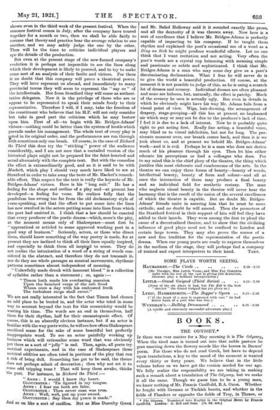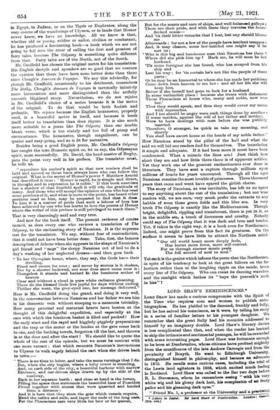BOOKS.
THE ODYSSEY.*
Jr there was ever matter for a May morning it is The Odyssey, When the tired man is turned out into that noble pasture he goes snorting down the flowery meads like the horses in Barnes' poem. For those who do not read Greek, but have to depend upon translations, a key to the mood of the moment is wanted every thirty or forty years. We believe that in the little volume before us we have got the version needed for our age. We fully realize the responsibility we are taking in making such a remark about a translation of The Odyssey, but we make it all the same. Though we guess him to be a young man, we know nothing of Mr. Francis Caulfeild, B.A. Oxon. Whether he fought with German or Turkish beasts, and whether in ate fields of Flanders or opposite the fields of Troy, in Thrace, or • The Odyssey. Translated into English in the Original Metre by Francis Canileild. London: (O. Bell and Sena. Va. Oci. not.) in Egypt, in Judaea, or on the Tigris or Euphrates, along the very course of the wanderings of Ulysses, or in lands that Homer never knew, we have no knowledge. All we know is that, whether old or young, soldier or sailor, civilian or combatant, he has produced a fascinating book—a book which we are not going to fall into the error of calling the first and greatest of fairy tales, because The Odyssey is something quite different from that. Fairy tales are of the North, not of the South.
Mr. Caulfeild has chosen the original metre for his translation. His English dactyls and spondees are so good that we venture the opinion that there have been none better done than these since Clough's Amours de Voyages. We say this advisedly, for though Mr. Caulfeild, occasionally to his detriment, remembers The Bothy, Clough's Amours de Voyages is metrically infinitely more harmonious and more distinguished than the artfully uncouth Highland story. Nevertheless, we do not rejoice in Mr. Caulfeild's choice of a metre because it is the metro of the original. To do that would be both foolish and pedantic. We rejoice because the English hexameter, properly used, is a beautiful metre in itself, and because it lends itself better to translation than does rhyme. It is also much more suitable to a poem like The Odyssey than our iambio blank verse, which is too stately and too full of pomp and circumstance. The hexameter, though magnificent, can be quaint and easy-going, and so is fit for narrative.
Besides being a good English poem, Mr. Caulfeild's Odyssey has caught the true Homeric spirit or, let us say, the Odysseyan spirit, most successfully. Mr. David, the head-master of Rugby,
puts the point very well in his preface. The translator must, he tells us,
" reproduce his author's spirit so that new readers shall be held and moved as those have always been who can follow the original. What is the secret of Homer's power ? Matthew Arnold has described it thus : ' Homer is rapid, he is simple and direct, in thought and in expression he is noble.' If this book exercises but a shadow of that fourfold spell it will win the gratitude of many. And those who will accept the opinion of one who has read some portions of it, and what is more to the point, has heard other portions read to him, may be prepared to find that it does. To him it is a matter of pride that such a labour of love has been achieved by one who has learnt to love the poems of Homer where the writer of this preface is still privileged to teach them."
That is very charmingly said and very true.
And now for the book itself. The present reviewer of course turned, as does every one who reviews a translation of The Odyssey, to the enchanting story of Nausicaa. It is the supreme test for the translator. We say, without fear of contradiction, that it could not have been better done. Take, first, the famous description of Athene when she appears in the shape of Nausicaa's girl friend and "nags" the sleepy Nausicaa out of bed to do a day's washing of her neglected dresses—and then goes back " To her Olympian home, where, they say, the Gods have their dwelling, Fixed and secure for ever : and never by storms is it shaken, Nor by a shower bedewed, nor ever does snow come near it Changeless it stands and bathed in the luminous aether of
heaven
Clear and without a cloud in pure white radiance gleaming. There do the blessed Gods live joyful for days without ending. Thither she went, the grey-eyed one, her message delivered."
Here is Mr. Caulfeild doing the grand, and doing it very well, In the conversation between Nameless and her father we see him in his domestic vein without stooping to a nauseous triviality. How many paternal and maternal hearts have beaten at the thought of this delightful expedition, and especially at the care with which the luncheon basket is filled and packed I How the early start and the rapid and higgledy-piggledy preparations and the trap or the motor or the landau at the gate come back to one, and the bathing towels, forgotten till the last, and thrown in at the door and after the start We should like to quote the whole of the rest of the episode, but we must be content with one more extract : that which recounts Nausioaa's instructions to Ulysses to walk sagely behind the cart when she drives back to town
There is no time to loiter, and take the same turnings that I do. But, when the city begins, where a lofty tower is standing, And, on each aide of the city, a beautiful harbour with narrow Entrance, and oar-driven ships drawn up by the side of the roadway, Each in her separate berth : and close at hand is the forum, Filling the space that surrounds the beautiful Pane of Poseidon Fitted together with stones that were quarried and hauled from a distance :
And it is here that they store the gear which vessels require, Mend the cables and sails, and taper the ends of the long oars. For the Phaeacians care very little for bow or for quiver, But for the masts and oars of ships, and well-balanced galleys t These are their pride, and with these they traverse the foam- flecked ocean— And 'tis their bitter remarks that I fear, lest any should blame me Afterwards : for not a few of the people have insolent tempers : And, it may chance, some low-minded one might say if he met us : ' Who is this big and handsome man that Nausicaa has there ? Where did she pick him up ? Mark me, he will soon be her husband.
'Tis some foreigner she has found, who has strayed from his ship and Lost his way : for 'tis certain he's not like the people of these parte :
Or he may be an Immortal to whom she has made her petitions Como down from heaven to see her : and all her life she will keep him. Better if she herself had gone to look for a husband In some outlandish place : because she treats with dishonour Those Phaeacians at home who, many and noble, now woo
her.'
Thus they would speak, and thus they would cover my narno with reproaches. And I too should be angry were such things done by another : If some maiden, against the will of her father and mother, Were to have dealings with men before she was publicly
married.
Therefore, 0 stranger, be quick to take my meaning, and shortly You shall have escort home at the hands of my noble father."
How Nausicaa stood by the pillar of the hall and what she said we will bid our readers find for themselves. The translation is simple and adequate. If it had been more it must have been condemned. What a miracle the lines are-I Just think how short they are and how little there there is of apparent artifice. Yet they work one of the greatest enchantments ever done in literature. They have sent a rapture through millions upon millions of hearts for years uncounted. Through all the ages Nausicaa remains the most lovable of princesses. Three thousand years that came and went have spared the girlish charm.
The story of Nausicaa, as was inevitable, has left us no space to say anything about the rest of the translation ; but our wise readers will, we are sure, very much prefer the extracts to any babble of even these green fields and this blue sea. In very truth The Odyssey is exactly like the Mediterranean. Though bright, delightful, rippling and translucent, there is yet in it, as in the middle sea, a touch of fierceness and cruelty. Nobody could say of The Odyssey that it was dark and true and tender. Yet, if taken in the right way, it is a book even for Northerners. Indeed, one might prove from this fact its greatness. On the surface it seems to have little to attract the Northern mind.
" Our old world heart more deeply feels, Has learnt more force, more self-control. For us through sterner musics peals The full accord of soul to soul."
Yet such is the genius which infuses the poem that the Northerner, in spite of his tendency to look at the great billows on the far horizon rather than at the laughing ripple on the sands, loves every line of The Odyssey. Who can resist its dancing wavelets and the sunlight which bathes its " bays the peacock's neck in hue" ?



































 Previous page
Previous page